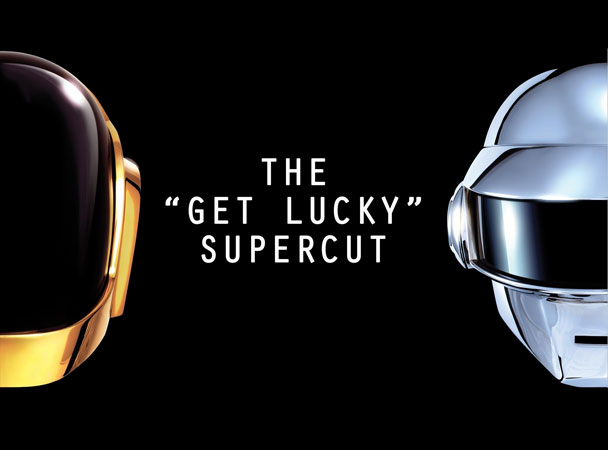As part of Stereogum's year-end coverage, The 2013 Experience, this week we’re presenting a series of interviews with the producers of our favorite songs of the year. Today, we've got Ariel Rechtshaid.
Ariel Rechtshaid might be the only person on the face of the earth who's worked with both Cass McCombs and Usher -- and, more importantly, who's done great things with both of them. More specifically, Rechtshaid, along with Diplo, produced Usher's boundary-shattering 2012 masterpiece "Climax," and he also produced Cass McCombs's best album, 2009's Catacombs, as well as the indie singer-songwriter's nearly-as-great 2011 efforts Wit's End and Humour Risk. On the one hand, then, Rechtshaid is an accomplished pop hand, one capable of helping a longtime industry pro like Usher locate his softest, most adventurous, most vulnerable side. And on the other, he's an indie guiding light, someone who can help a born-vulnerable enigma like McCombs locate his inner Roy Orbison. Rechtshaid, then, has long occupied a thin edge where big-money pop and indie rock bleed into one another, where those distinctions stop mattering. And 2013 was a banner year for him, as he produced or co-produced some of the year's most brightly glimmering gems -- Vampire Weekend's Modern Vampires In The City, HAIM's Days Are Gone, Sky Ferreira's Night Time, My Time, and Charli XCX's True Romance, among others. These are all smart, tricky, elusive albums, albums where smart melodic decisions fly at you every minute and every sound resists categorization. These albums don't necessarily have a ton in common, but taken together, they make for one hell of a body of work. We got Rechtshaid on the phone a few days before he was nominated for the Producer Of The Year, Non Classical Grammy award, a category that'll pit him against mainstream pop visionaries like Pharrell Williams and Dr. Luke. The nomination was a surprise, certainly, but the man earned it. If anyone working right now can change the way pop music sounds, it's Ariel Rechtshaid.
STEREOGUM: You just went to New York and helped HAIM with sound on SNL. What does that entail?
RECHTSHAID: Just like any situation in the studio, it helps to have somebody on the other side of the speakers who you trust, and who knows your sound and what you're going for. Basically, I know what they're supposed to sound like, so I'm in there just working with the dudes from SNL, who are totally awesome. It's just that if they don't know what it's supposed to sound like and they're working on a new band every week... And then, it's also just giving the band feedback and working on keyboard sounds and that sort of stuff. It's a lot more critical on television than it is live. Things are a little bit more vague live, and on television it's a lot more microscopic. It was a big deal for them. It's a big deal for anyone, obviously, but it was their first time doing something like that, so I wanted to be there for it, to help them.
STEREOGUM: Yeah, it was cool to see. A lot of SNL performances are just another stop on the publicity tour, but with them you kind of sense that it was a big moment for them. It seemed to matter that they were on TV more than it would with some other people.
RECHTSHAID: Yeah, exactly. They're totally appreciating every moment of what's going on. To watch it every step of the way, it's a dream come true for them.
STEREOGUM: In the last week or so, different publications have started putting out their year-end lists. I don't know how much attention you pay to this stuff, but the records you worked on have been doing very well. Have you noticed this?
RECHTSHAID: Well, it's not something that I seek out, but yeah, I got forwarded the Rolling Stone article and Vampire Weekend was number one, which was a huge honor. It's abstract and always a mystery as to how people arrive at those lists, but one way or another, the record made an impact, and it felt good -- and similarly, with HAIM and Sky Ferreira as well. It's wild and really cool.
STEREOGUM: As somebody who works on these records but whose name isn't on the cover, when they get a response like this, do you feel that reflects on you at all?
RECHTSHAID: Well, I don't really care what people think of me. It's more rewarding for me, personally. I know how involved I was in those records and how hard I worked on them, and it's nice that people appreciate it -- not even appreciate the work, but people appreciate the records. I take it in my own personal way. I'm definitely not competing for credit or anything like that. I've never been really out for the vanity of it. I'm really just trying to make the best music I can. And when people speak and the records are as revered as they were this year, it's definitely a good feeling and is very rewarding. I mean, I never feel relaxed or at peace. It's always, "What's next and how am I going to continue to make fresh sounding music?" The job is not done. It's nice, but I'm cracking on.
STEREOGUM: When you're working with somebody like Vampire Weekend, who seem to have a really clear sound in mind, or something like Usher, who has been a lifelong industry-insider professional type, do you take a different approach, compared to when you're working with HAIM or Sky Ferreira, who are maybe still finding their legs?
RECHTSHAID: Every project is different, but I will say that it's true that Vampire Weekend has a sound. Usher has a sound, I guess, but not really. When we went into make those records, it was all about reinventing it. Of course, they are who they are, and the sound is familiar because it's the same human beings, and it's honest music that's coming from inside of them. But other than that, there was nothing to lean on stylistically or aesthetically. It's a quest for something new that feels meaningful. I mean, with Vampire Weekend, we made a conscious effort to make it not sound like anything that they had done before. For instance, we used very little guitar. I don't know if it was leaning on anything specifically, but we developed a common thread in the lyrical content and the songs, and developed a sound. There was a lot of stuff going on, but if it sounded like anything they had done before, we pretty much tossed it out and started over. We were really making an effort to find a reason to keep making music when the original intent was to make music that sounds like something you've never heard before, something fresh and new. Their record can't sound like the first or second.
STEREOGUM: HAIM have a sound that's hard to pin down. Every single element of the track seems to be coming from somewhere else.
RECHTSHAID: These genres that music sits into have been around for a long time. But at this point, I don't think music fits into those genres always anymore. It's early, in a way, but perhaps in a few years we'll find a new genre that all this music fits in to or a way to describe it. Basically, there's all this music from the beginning of our lives that's influenced us, and our reference points in our subconscious. And that, on top of the quest to make something new and interesting and fresh-sounding and heartfelt and meaningful and all that, that creates a music med that's not always easy to pin down. As long as it grabs you and is still intimate and honest and good and likable, that's the idea -- definitely not only not trying to fit into previous genres but trying to not to fit into those genres, you know? To make an effort to not get cornered into a sound.
STEREOGUM: Sky Ferreira, before she made this record with you, had been in the industry for a pretty good chunk of her life and was vocal about the fact that she didn't really feel at home in it. But you put the album together with her really quickly. Was there a moment where you felt like you were hitting your stride?
RECHTSHAID: It's true that it came together quickly, but there's a little bit of that story that's been misunderstood. We met probably two years ago and starting talking and feeling each other out, and I was catching a vibe off of her. We started to make music. Of course, at that time she had been making music and trying different things out and seeing what worked. Over the course of a year, we came up with about six or seven songs. Along the way, there was "Everything Is Embarrassing," which came out on an EP. Then, the record was done, and there was about seven songs that I had worked on and about five or six that Jon Brion had worked on. It was a tighter version of the EP, where there was a varied cross-section of songs. Honestly, at that point, I was brought on to do only a certain amount of songs, so my job was done, and the amount of control that I had was over. The label was happy with the record and was ready to put it out and I think Sky, more credit to her, decided at some point that she didn't want that kind of a record -- the modern way of making records where you work with multiple producers and the sound is all over the place. She wanted it to be more cohesive, and she came back to us. That final bit was the moment that things happened very quickly. There was a version of the record, and then three weeks later there was a completely different version of the record with all rough mixes. The record had already been mixed, and the effort was to kind of create a little more cohesiveness between the different bodies of work. But by the time we did the five new songs really quickly, there wasn't time to go back in and mix the whole thing again. In order to give it a common sound, we just left it all as the rough mixes, and that's basically what you've got there. It was really quick and rough around the edges, and there were a lot of mistakes, but I think that the mistakes are actually happy accidents. Part of the vibe is letting it go and that frenetic energy, going in to do it real quick because we're missing our release date already.
STEREOGUM: It hadn't occurred to me until you mentioned Jon Brion, but he's somebody who reminds me of you in a way. He's done a lot of work in different genres and backgrounds, and it's hard to pin down exactly what he brings to it. It's all feel.
RECHTSHAID: I'm only familiar with so much of his stuff, but from the music he made for the soundtracks to the stuff he was playing on Fiona Apple records, I could hear it very clearly. He has a style for sure, and sounds that he pulls from. But I think the common thread between he and I, which I guess is more rare these days, is that we're musician-producers, not beatmakers or top-100s or specifically rock guys. We're not engineers. It's more of a musical thing, so the boundaries tend to be wider, and the style of producing is more in how you approach each different sound and artist rather than the actual sound of the artist.
STEREOGUM: After the year you've just had, working with a whole bunch of different people, your name seems to be coming up more than it did a year ago. As somebody who's been in a couple of bands, have you thought about making your own music anytime soon?
RECHTSHAID: No, I haven't. I'm hesitant to say anything with any finality in it, but that’s not really what I'm doing these days. There's other ideas that I have for records that I'd like to curate, that may or may not be about one specific artist -- but more like a theme. I don't know; it's vague. I have thoughts. But nothing in the near, near future.
STEREOGUM: How would you curate a record? That sounds cool.
RECHTSHAID: I'm constantly blown away with the pool of talent that I'm around. I don't have any specific thoughts, but I imagine that at some point in my career, I'll figure out a way to do a record that's different.
STEREOGUM: Like putting different musicians in the room together?
RECHTSHAID: Who knows? It's not something that I've sat and thought about. It's just a feeling that there’s something more that I have to do, and at some point I will, but nothing yet.
STEREOGUM: Are you working on anything right now that you can talk about?
RECHTSHAID: Well, the work never ends. I'm still working with HAIM. Things happen; we're creative people. You go to New York and work on SNL and start talking about new music. I'm in the studio with Rostam [Batmanglij of Vampire Weekend], working on new music. You never know what thats going to turn into. It's a constant thing. It's my life. It's not really project-by-project or a job; it's just always happening. I'm also in the studio writing with Amber Coffman from Dirty Projectors. I met up with Diplo last night, talking about stuff again. It's just constant.
STEREOGUM: With the albums that came out this year, you'd been working on some of them for a long time. When you're working on a record, is there ever a moment that someone says, "OK, you're the producer now"?
RECHTSHAID: I guess things have changed. There are a certain pool of people that I work with that are constant. And then, at some point, we decide to organize our thoughts and hear our technical roles or whatever. Then, when it's done, it's obvious what it is. But working with Vampire Weekend was very vague. It started very casually, and it just happened that we were a good team. It really was a team effort; it was a co-production. With the new artists I didn't know before, like HAIM, it was a little bit more of a formal thing, where I produced a certain number of songs. It's different every time, but it always feels very organic, and based a lot on chemistry. When things start to click is when you become the producer. And sometimes I'm not. Sometimes, I'm just playing, and sometimes I'm just turning knobs on the console. I do whatever it takes and fill whatever role I need to fill on the record I'm working on.
STEREOGUM: As you became a producer, have there been any people who taught you to fulfill that role, filling in the blanks and doing whatever needs to be done?
RECHTSHAID: Not really. I didn't go to school for it. I watch and experiment a lot. I'm young, but I started when I was really young. I started as a teenager, so I've been playing with samplers and drum machines and microphones since I was living in my parents' house. Over the years, I've found myself in so many different positions, whether I'm in a band writing and performing, or recording a rapper and programming the sampler, or recording a band on a console with a tape machine. Obviously, I started out working with engineers who knew what they were doing and learned what I liked and didn't like. And I took it from there.
STEREOGUM: When you're listening to music that you didn't produce, do you ever find yourself thinking that you would do things differently?
RECHTSHAID: It's an interesting question. Not really. I take it as what it is. It's like reading an interview. If you've been interviewed before, you can imagine what came off the right way or the wrong way or whatever. And with music, it's the same thing. You can imagine that it's possible that this band was going for something else. But with music, everything is a learning experience. Some of my favorite records sound the way they do by accident -- not necessarily by accident, but as a product of the environment. The only decision you can control at the end of the day is whether you think it's good enough to release or not. Other than with very cookie-cutter music, Everything else along the way is a series of trial and error -- a series of happy accidents or experiments. I don't really think about of what I would have done. I just think about whether I like the outcome.
STEREOGUM: Feel free to not comment on this, but there's recently been a thing between Solange and Dev Hynes. You worked with both of them on True.
RECHTSHAID: Oh god, no comment.
STEREOGUM: The reason I brought it up is that nobody seems to be accusing you of taking too much credit for anything.
RECHTSHAID: Well, I mean, haven't I just been given credit for what I've done? I don't really know what to say about that. I'm not very outspoken about what I'm doing on social media. I just do what I do and release it. There's a whole internet social world revolving around work that I don't partake in. Things are so unnecessarily dramatic sometimes. I'd rather just not comment on any of it, just because it's sensitive. I feel like the root of all of this is some sort of misunderstanding, and I don't want to perpetuate misunderstanding or miscommunication.
STEREOGUM: One last question: Are you still spending that "Hey There Delilah" money?
RECHTSHAID: [Laughs] No, that well has run dry. Maybe if I'd written it.






